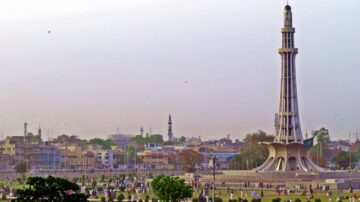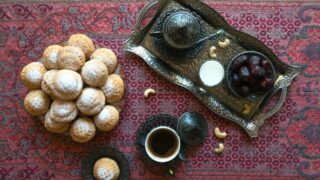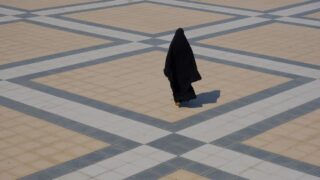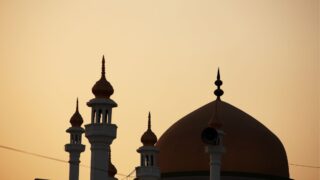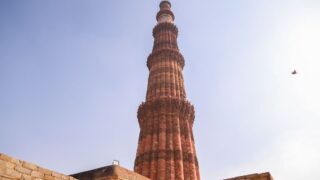Not long after the dust has settled from the excitement of Eid Al-Fitr in the dusty, humid seaport of Karachi[1], the bleating of goats and cattle signals the imminence ofEid Al-Adha. Goat-sellers appear in open spaces amid the hustle and bustle of budget-bazaars to display their wares.
Soon the streets of high-rise apartment blocks and sprawling bungalows are teeming with fodder-chewing, lazing sacrificial animals – known as Adha or udhiyah in Arabic. No one cares about the filth; these animals are held close to the heart, given plenty to eat, and excitedly decorated with garlands.
As this Eid has a fixed date, no one climbs roof-tops to spot the crescent! The night before Eid is called the Night of the Moon-Sighting and during this time women dash to the markets for last-minute bangle shopping and henna decoration. Bazaars, shopping malls, and sweet-meat shops do a roaring trade. The men pop in at the open-air cattle market in the early hours of Eid Al-Adha, animatedly negotiating prices in their last-minute quest for a good animal. Banners appear outside mosques announcing the time for Eid congregational prayer the following morning.
Dawn on the tenth day of Dhul-Hijjah is witness to kitchens wafting the appetizing aroma of “sheer khorma” – the thick, creamy, nutty milk-and-vermicelli concoction traditionally prepared as Eid breakfast. Children are shaken out of their slumber; servants rub their eyes as they jerk water-pumps into action, initiating everyone’s pre-Eid-prayer ghusl or bath. Doors bang as everyone prepares for `Eid prayer.
Morning light falls on decked-up families rushing in their cars towards the venue of Eid prayer, inevitably a mosque or a spacious grassy area. The elderly are carefully taken by grandchildren, asEid is a traditional family-bonding affair. Parking space is difficult to obtain and people are greeting the imam’s loud Takbir..
After prayer, hugs are exchanged amid warm greetings. The men search for a butcher right away, to slaughter their animal(s) outside their home, while the women pull up their sleeves and take out the heaviest pots, pans and trays for storing and sorting the fresh meat that is due to arrive soon.
After the animals are slaughtered, the liver reaches the stove at around mid-morning, and a roasted kaleji and paratha/naan-bread breakfast is cooked for those who have observed the sunnah of fasting since the morning. As the mutton chops, ribs, thighs and flanks arrive in the kitchen, rice is soaked and onions are sliced for the biryani and qorma (curry) to be served at lunch. The women swiftly sort the fresh udhiyah meat into packets, some of which go into the freezer, while the rest are to be delivered to relatives and the needy later in the day.
The elderly in Pakistani society draw the scattered family members on `Eid. Guests keep pouring in with portions of meat as gifts. They are served sweetmeats, sheer khorma, kaleji and tea in the drawing room. Most families unite at an elder’s residence for lunch and dinner.
Servants are around in abundance during Eid, as slaughtering the animal, lifting the heavy meat, and delivering it by car to relatives’ homes necessitates their help. They also look forward to a hearty mutton lunch and more meat to take home, asEid Al-Adha is the one time during the year when millions of the country’s poor get to eat fresh mutton.
During `Eid Al-Adha the enthusiastic Islamic spirit of sharing ensures that one man’s meat is another man’s pleasure!
[1] Sadaf Farooqi shares the tastes and smells of `Eid in her home country, Pakistan
- Excerpted with kind permission from sisters-magazine.com

